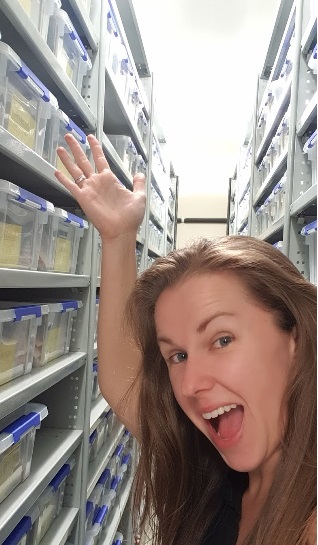Job title
Leader Plant Pathology Curation
How did you choose your job? Or did it choose you?
It very much chose me. In 2007 I was part of an internship with the National Herbarium in Sydney, this experience opened my eyes to the world of scientific collections. Little by little I fell into roles that would prepare me to curate the NSW Plant Pathology & Mycology Herbarium – a PhD in plant pathology, a herbarium position in the states, a post-doc working on phylogenetics and a lot of science communication and engagement. All perfect experiences for re-vitalising the NSW DPI Biosecurity Collections and raising awareness of plant biosecurity.
What does a typical day look like for you?
Typically, the core purpose of the collections is to provide data and specimens for reference and research. We answer a lot of inquiries about pest and disease status for NSW, provide living cultures of fungi and bacteria for researchers and industry and loan our preserved specimens across Australia and around the world. Researchers examine the historic specimens to confirm records and extract DNA for genetic studies. On top of that there is a lot of engagement work, engaging DPI staff, external stakeholders, and funding bodies to raise support for various projects. I am also the Institute Director for the Orange Agricultural Institute, where the collections are located, so I also lead the promotion of the site and work of our research teams.
We have a quick video on our website talking about what we do too: dpi.nsw.gov.au/about-us/services/collections/herbarium
How long have you worked in this area and what roles have you had previously?
I have been with DPI for 4.5 years now. I completed my PhD in 2013 and, thanks to a little networking at conferences, I had a herbarium job lined up at Purdue University in the USA. The role really immersed me in collections management, mainly data and imaging. As that project ended, I moved on to the National Fungal Collection with the United States Department of Agriculture, this was a great experience and my first taste of a government research environment. While I was working with the collection there, I wasn’t performing any curation or management, I was using the specimens to extract DNA for phylogenetic studies. I really enjoyed the work but missed having a collection in my care. My current role at DPI popped up on my job alert for “herbarium”, perfectly timed as my work was completed and I booked a one-way tickets home with my fingers crossed.
What training/education have you received?
I have an undergraduate degree in Agricultural Science from the University of Sydney and PhD, also from USYD, in Plant Pathology, which focused on molecular diagnostic development. This was funded by the CRC for plant biosecurity and gave me a lot of contacts and experience in that space.
What is your greatest career achievement?
One of the goals I set out with at the start of this role was raising the profile of the Collections and encouraging specimen collection and accessioning; to increase support for the Biosecurity Collections and foster a better understanding of our work and role. I have taken part in a lot of engagement activities, speaking at local schools, podcasting with Costa, holding exhibitions at the Orange Regional Museum, setting up a Redbubble store to sell our unique plant pest and disease artworks (redbubble.com/people/biosecuritycoll) and a number of activities for science week and the international year of plant health.
All of this work has given me a great network both internally at DPI and external across various organizations. This has helped me source funding to achieve various goals for the collections – imaging specimens, databasing specimens, upgrading equipment and facilities. And all this work is strengthening our collections and the services we can provide.
How do you see your role changing/improving in the next 2-4 years?
We have just changed management recently and as a result the collections are better aligned with research and diagnostics within DPI. I see the collections being more involved in diagnostic development and helping with identification of those ‘out of the ordinary’ samples. I want to see the collections be more involved with researchers and their specimens, taking the lead to ensure that DPI staff are securing their valuable biological assets, for their own sake and for future research.
What advice would you give anyone starting or changing their career?
The old adage “it’s who you know, not what you know” is so accurate. My first two positions out of my PhD were with someone I met at a conference and then with someone they had worked with. Having someone who can vouch for you does wonders, it is always hard to gauge someone’s personality and ability in an interview and you’d be surprised how many jobs are right place, right time – hearing things through the grapevine. Attend conferences, network, cold-call people about volunteering or interning. If you’re a student, work in your professor’s lab. Just get experience and contacts.
